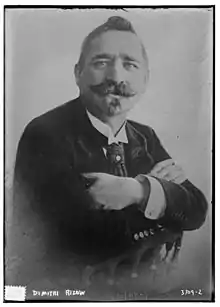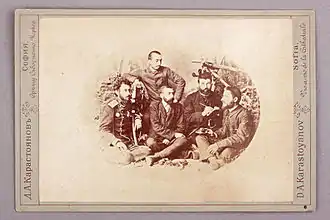Dimitar Rizov
Dimitar Hristov Rizov or Rizoff (Bulgarian: Димитър Христов Ризов; 1862 – 1918) was a Bulgarian revolutionary, publicist, politician, journalist and diplomat.
Dimitar Rizov | |
|---|---|
 | |
| Born | 1860 |
| Died | April 23, 1918 (aged 58) |
| Nationality | Ottoman/Bulgarian |
| Other names | Dimitar Rizoff |
| Occupation | Deputy in the Bulgarian Parliament from the Liberal Party |
| Known for | Bulgarian revolutionary and diplomat |
Life
Rizov was born in 1860 in Bitola, Macedonia. At first he studied in his native town and then he continued study in Plovdiv. In 1881 he opened a book store in Bitola, and a year later he was a Bishopric school inspector of the Bulgarian schools in Macedonia.
In 1884 he began to participate in the Bulgarian politics; became an editor of the Liberal Party newspaper Tarnovo Constitution. Rizov was a part of the immigrant wave in the Eastern Rumelian capital Plovdiv, where he actively participated in the Bulgarian Secret Central Revolutionary Committee and in the preparations for the Bulgarian unification.[1] He was a member of the temporary government in Plovdiv on September 6–9, 1885.[1] Rizov was an MP in the Third Great National Assembly (Parliament)(1886–87).[1] In 1887 he continued his education in University of Liège in Belgium with an Evlogi Georgiev stipend.
Rizov was an editor of the newspapers Hristo Botev, and co-editor (with Andrey Lyapchev) of Young Bulgaria (1895–1896). He co-edited Self-defense (1885), Macedonian Voice (1885–1887), Independence (1886), and other newspapers.[1] He is an author of the first Ethnography of Macedonia (1881, in French)[1] and of a number of pamphlets on Bulgarian foreign policies.
Since 1897 Dimitar Rizov worked as a diplomat. He was a Bulgarian ambassador in Skopje (1897–1899), diplomatic agent in Cetinje (1903–1905), Belgrade (1905–1907), plenipotentiary minister in Rome (1908–1915), and Berlin (1915–1918). In 1917 in Berlin, together with his brother, Nikola Rizov (also diplomat and publicist), he published the Atlas Bulgarians in their historical, ethnographic, and political frontiers, Berlin 1917, containing 40 maps and explanatory texts in German, English, French, and Bulgarian. Of special significance are the maps, drawn by the leading Bulgarian scientists Prof. Anastas Ishirkov (geography) and Prof. Vasil Zlatarski (history). The atlas contains facsimiles of maps by Pavel Jozef Šafárik, Ami Boué, Ljubomir Davidović, Lejean, F. Hahn and Zach, Mackensie and Irby, Prof. Erben, Elisée Reclus, Kiepert, Synvet, Vasil Kantschoff, and others.

Rizov often changed his political positions for which he was known with the nickname "The Man of the Hundred Opinions".[2] For his opposition to Kniaz Ferdinand, Rizov was sent to prison; later, however, Rizov accepted the Kniaz's regime and political aims. With respect to the Bulgarian national question, and, in particular, to the Macedonian Question, Rizov is unwavering in defending the rights of Bulgarians living outside of the Bulgarian borders.
References
- Durham, Mary Edith. Twenty years of the Balkan tangle, BiblioBazaar, LLC, 2007, ISBN 1-4346-3426-4, p. 83, Project Gutenberg e-text # 19669
- Encyclopedia Bulgaria, Bulgarian Academy of Science Publishers, vol. 5, Sofia (Енциклопедия България, т. 5, Издателство на БАН, София), 1986.
- Radev, Simeon. Builders of modern Bulgaria, vol. 1, Sofia (Симеон Радев, Строители на съвременна България, т. 1, София), 1973, стр. 494–496, 506-508
- Topencharov, Vl. Bulgarian Journalism 1885-1903, 2nd ed., Sofia (Топенчаров Вл., Българската журналистика 1885-1903, 2 изд., София), 1983
Notes
- Antonova Il., Marinkova V., Mitev Pl., Antonov Al., History of Bulgaria — Encyclopedia A-Z, Sofia (Антонова Ил., Маринкова В., Митев Пл., Антонов Ал., История на България — Енциклопедия А-Я, София), 2001, ISBN 954-18-0227-3, стр. 319-320
- Encyclopedia Bulgaria
External links
| Wikimedia Commons has media related to Dimitar Rizov. |